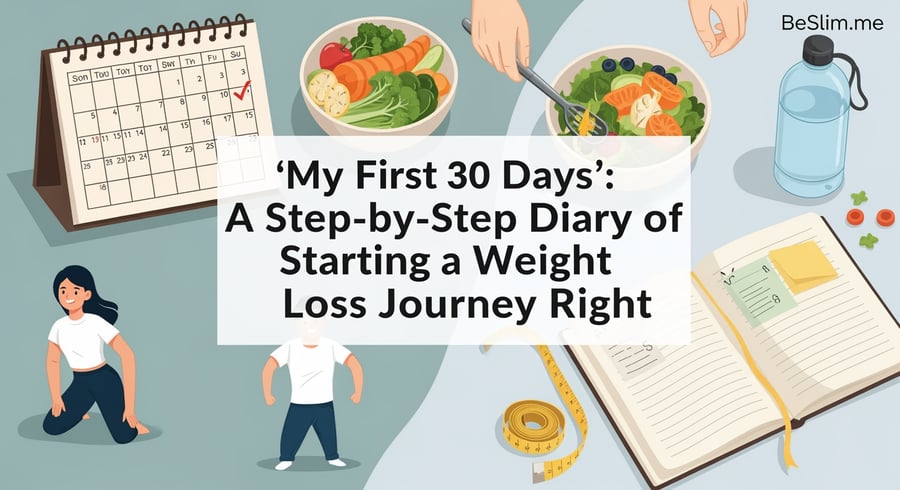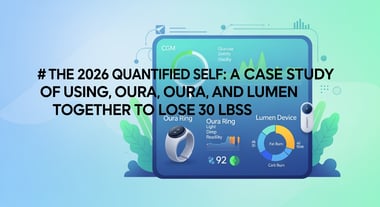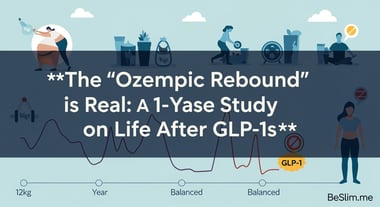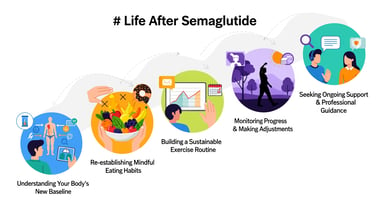Hi, I'm Alex, and if you're reading this, maybe you're where I was just a few months ago—staring at the scale, feeling defeated, and wondering if real change is even possible. As Master Kim, the Empathic Storyteller for BeSlim.me, I want to share Alex's story in their own words. But to make it truly personal and connective, I'll let Alex narrate it directly in the first person, drawing from their diary entries. This isn't about quick fixes or miracles; it's about the raw, honest grind of starting a weight loss journey the right way. I've seen so many transformations like this, and they all start with that first, shaky step. Let's dive in.
Part 1: The Struggle (The 'Before')
I remember the morning it all hit me. I was 35, standing in front of the mirror after another sleepless night, my clothes feeling tighter than ever. At 220 pounds on a 5'10" frame, I wasn't just overweight—I felt trapped in my own body. The emotional weight was heavier than the physical. Every day started with good intentions: a quick jog, a salad for lunch, maybe skipping the late-night snacks. But by evening, stress from my desk job would creep in, and I'd reach for comfort food. Pizza, chips, anything to numb the frustration.
My struggles weren't new. I'd tried everything—or so I thought. There was the crash diet phase in my twenties, where I dropped 15 pounds in two weeks by barely eating, only to gain it back plus more when I couldn't sustain it. Then came the gym memberships I used for a month before life got in the way. I even attempted those trendy apps that promised personalized plans, but they felt impersonal, like following a robot's orders. Each failure chipped away at my confidence. I'd look at myself and think, Why can't I just get this right? Am I broken?
Emotionally, it was a rollercoaster. Mornings brought hope, but by afternoon, the cravings hit hard. I'd feel guilty after every "slip-up," which only led to more emotional eating. Work stress didn't help; deadlines piled up, and I'd cope with sugary coffee and vending machine runs. My relationships suffered too—date nights with my partner turned into excuses to stay in and order takeout because I was too self-conscious to go out. I avoided photos, skipped social events, and even dreaded family gatherings where well-meaning relatives would comment on my weight. It wasn't just about the pounds; it was the isolation, the shame, and the constant internal battle. I knew I needed to change, but every attempt felt like running into a wall. How many times can you fail before you stop trying?
Looking back, I realize now that my failed attempts were rooted in unsustainable extremes. I wasn't addressing the deeper issues, like why I turned to food for comfort or how my habits were wired into my daily routine. It was a cycle of highs and lows, leaving me exhausted and heavier than before.
Part 2: The Turning Point (The 'Solution')
The shift happened on a rainy Tuesday evening, about 30 days before I started seeing real progress. I'd just binged on a tub of ice cream after a tough day, and instead of the usual self-loathing, I felt a spark of curiosity. Why does this keep happening? I grabbed my laptop and dove into some research—not the flashy diet ads, but actual science. That's when I stumbled upon concepts that made everything click: leptin resistance, cortisol management, and habit formation. It wasn't about willpower alone; it was about understanding my body's signals and rewiring my behaviors.
Leptin, I learned, is the hormone that tells your brain you're full. But when you're overweight and eating poorly, your body can become resistant to it, making you feel hungrier even when you've had enough. Research on leptin resistance shows it contributes to overeating in obese individuals, which explained why my cravings felt unstoppable. This wasn't just me being weak; it was biology fighting back against years of poor habits.
Then there was cortisol, the stress hormone. My high-stress job was spiking it constantly, leading to belly fat storage and more cravings. Studies from the Mayo Clinic highlight how chronic stress elevates cortisol levels, promoting weight gain, especially around the midsection. I realized my emotional eating was a direct response to unmanaged stress, not laziness.
The real game-changer was learning about habit formation. It's not about massive overhauls but small, consistent changes that build over time. According to habit formation research from the NIH, creating routines through repetition can rewire neural pathways for long-term success, making healthy choices automatic.
Armed with this knowledge, I decided to start small and smart. No more all-or-nothing diets. Instead, I created a 30-day diary to track my journey step by step. Day 1: I focused on hydration and walking. Just 20 minutes a day, no pressure. To tackle leptin resistance, I incorporated more whole foods—veggies, lean proteins, and healthy fats—to help reset my hunger signals. For cortisol, I added simple stress-busters like deep breathing before meals and a no-screens rule after 8 PM to improve sleep.
By Day 7, I was logging meals mindfully, noting how stress affected my choices. I discovered apps for guided meditation, which helped lower cortisol without feeling overwhelming. Habit-wise, I stacked new behaviors onto existing ones: a short walk after breakfast became non-negotiable. It wasn't perfect—there were slip-ups, like grabbing a donut on Day 12—but I treated them as data, not defeats. The science backed me up; consistency over perfection was key.
This new approach felt different because it was rooted in understanding my body, not fighting it. By Day 15, I noticed subtle shifts: fewer cravings, better energy. It was the turning point—I was building a foundation, not chasing a quick win.
Part 3: The Success (The 'After')
Fast forward to the end of those first 30 days, and the changes were profound, though not in the dramatic, infomercial way. I'd lost 8 pounds—not a huge number, but it felt sustainable. More importantly, my clothes fit better, and I had energy I hadn't felt in years. Waking up wasn't a drag; I looked forward to my morning walk, which had evolved into a 30-minute routine with some light jogging.
The transformation went beyond the scale. Emotionally, I felt empowered. Stressful days at work didn't derail me anymore—I'd pause, breathe, and choose a healthier option. My relationships improved too; my partner and I started cooking together, turning meals into bonding time instead of takeout regrets. Socially, I said yes to invitations, feeling more confident in my skin. Even small wins, like fitting into an old pair of jeans on Day 25, boosted my mood and motivation.
Physically, the science I'd applied paid off. Better leptin sensitivity meant I felt full on less food, and managing cortisol helped reduce that stubborn belly fat. Habits like meal prepping on Sundays became second nature, making healthy eating effortless. By Day 30, I'd built a routine: balanced meals, daily movement, and stress checks. It wasn't about perfection; some days I still craved junk, but I had tools to handle it.
Life overall transformed. I slept better, thought clearer, and even got a compliment from a coworker on my "glow." The journey taught me that weight loss isn't a sprint—it's a series of small victories that compound. I still have goals, like reaching 180 pounds, but now I trust the process. The first 30 days proved that starting right, with empathy for myself and a nod to science, makes all the difference.
Key Lessons for Your Journey
Start Small and Build Habits Gradually: Don't overhaul everything at once. Focus on one or two changes, like adding a daily walk, and let science-backed habit formation do the rest—repetition creates lasting change.
Address the Root Causes, Not Just Symptoms: Understand your body's signals, such as leptin and cortisol, through simple research and adjustments. This turns struggles into strategies, making progress feel natural.
Embrace Imperfection with Compassion: Slip-ups happen; treat them as learning opportunities, not failures. Consistency over time, fueled by self-kindness, leads to real, sustainable transformation.
References
- Research on leptin resistance shows it contributes to overeating in obese individuals - ncbi.nlm.nih.gov
- Studies from the Mayo Clinic highlight how chronic stress elevates cortisol levels, promoting weight gain - mayoclinic.org
- According to habit formation research from the NIH, creating routines through repetition can rewire neural pathways for long-term success - newsinhealth.nih.gov
Medical Disclaimer
The content on this website is for informational and educational purposes only. It is not intended as medical advice and should not be relied upon as a substitute for consultations with qualified healthcare professionals who are familiar with your individual medical needs. Always seek the advice of your physician or other qualified healthcare provider with any questions you may have regarding a medical condition. Never disregard professional medical advice or delay in seeking it because of something you have read on this website.




